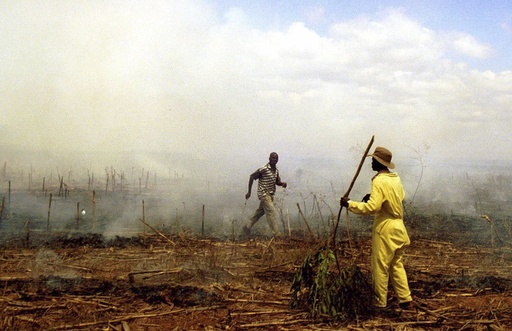
HARARE, Zimbabwe — The government of Zimbabwe has announced plans to compensate both local and foreign white farmers who lost their land and assets more than two decades ago during a controversial land reform program intended to rectify the injustices of colonialism.
Approximately 4,000 white farmers were displaced from their homes and farmlands when the land redistribution initiative was initiated by then-President Robert Mugabe in 2000. This initiative, which was often marked by violence and chaos, aimed to address the disparities in land ownership established during the colonial era after Zimbabwe gained independence from white minority control in 1980. Mugabe passed away in 2019.
At a recent meeting with diplomats, Finance Minister Mthuli Ncube revealed that the government had approved 441 compensation claims for local white farmers, which total approximately $351.6 million, and 94 claims from foreign farmers amounting to around $196.6 million. However, only a small fraction, 1% or $3.5 million, will be disbursed in cash to local farmers; the remaining amount will be paid through treasury bonds, according to Ncube.
Foreign farmers are set to receive an initial $20 million, which will be divided equally among the 94 claimants from various countries, including Denmark, Germany, the Netherlands, Switzerland, and several Eastern European nations.
The aggressive land seizures predominantly affected white farmers who possessed extensive tracts of prime agricultural land. Many of these removals were accompanied by violent acts perpetrated by mobs, often comprising veterans of the independence struggle. Human Rights Watch has documented severe violence during this time, including instances of assaults and sexual violence, leading to fatalities among some farmers and their workers.
The consequences of these land seizures were significant, crippling commercial agriculture and transforming Zimbabwe from a key food producer and exporter into a nation reliant on international aid. Although Zimbabwe’s agricultural sector has shown signs of recovery in recent times, coping with recurrent drought conditions remains a critical issue.
The compensation planned for local farmers will not cover the land itself—deemed to be rightfully taken from Zimbabwe’s Black majority during the colonial period—but rather it pertains to the necessary infrastructure like buildings, water wells, and irrigation systems. In contrast, foreign claimants will receive compensation for both the land and the improvements made to it, as stipulated by agreements designed to safeguard foreign investments.
Ncube has indicated that these compensation payments are anticipated to begin in the final quarter of 2024. Since 2022, Zimbabwe has been in discussions with creditors, primarily the African Development Bank, to restructure its debt, which totals $21 billion; the compensation to white farmers has emerged as a contentious issue in these talks.
In 2020, President Emmerson Mnangagwa’s administration reached a compensation agreement with white farmers. Mnangagwa, who took office in 2017 following Mugabe’s resignation due to a public uprising, has made efforts to reconnect with the white farming community and has even advocated for them to apply for new agricultural lands.
Currently, all agricultural land is state-owned, and those utilizing it do so under lease agreements. Nonetheless, a recent policy announcement indicates that beneficiaries of the initial reform program may now sell the land they received, albeit exclusively to “Indigenous Zimbabweans,” referring to Black Zimbabweans.
This new policy shift has drawn considerable criticism, particularly because some individuals with political ties have obtained multiple farms, capitalizing on a land redistribution program intended to assist the underprivileged, thereby raising concerns about equity and fairness in this contentious historical context.
